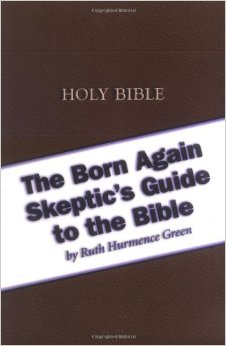
The Born-Again Skeptic’s Guide to the Bible
The Born-Again Skeptic’s Guide to the Bible
By Ruth Hurmence Green (Published in1979 by Freedom From Religion Foundation. 310 pages)
It is difficult not to be impressed by the quality of this work, doubly so perhaps, when one learns the author was not a writer with years of professional experience. In fact, Ruth Green (1915-1981) was mostly engaged as a homemaker and mother who read the Bible from cover to cover while convalescing from an illness. Her resulting expose’ provides a sorely needed woman’s perspective of this so little understood, and far too revered collection of ancient musings and delusions.
For Ms. Green, the Bible is in no way divine as its adherents claim. Were it so, its text would be clear and simple enough for all to understand, devoid of errors and contradictions, leaving no possibility for misinterpretation. Certainly it would never need the clarifications of theological scholars, specialists, or high priests. A clearly written, non-contradictory account would eliminate incipient Jim Joneses and David Koreshes from gaining any followers.
Because this is unquestionably not the case, objectively honest individuals can hardly conclude anything other than that the Bible was indeed written over a long period of time by many different authors of differing views, although they all seem to share one common idea: the instilling of fear and guilt, rather than love, in their readers. The literary mishmash that is the Bible has given self-serving clergy the power (on occasion of life and death) to intimidate and control their flocks. Objectively analyzed in this way, what faith in god really means is faith in the clergy.
Green’s writing style can be engagingly witty as well as bitingly sardonic. Trudging through the murky waters of scripture—while avoiding ponderous pedantry—she exposes the profusion of absurdity, inconsistency, and atrocity contained therein. As but one example, she says of the biblical god, “For his companions in eternity, he prefers not the accomplished, the brilliant, the stimulating, not the outstanding achievers who may not conform, but the docile, the gullible, the child-like, the nondescript nonentities with nothing to recommend their selection but blind belief.”
If the question is raised, “Are these not the meek who will inherit the Earth?” one need only quote, “Is it not your omnipotent, omniscient god who bestows such qualities? Where is the free will which would give justice to his reward and retribution?”
Do the theologians have any rejoinder in countering Ruth Green’s well-aimed and hard hitting invective? Most likely not. Where logic is irrefutable, they shrewdly remain silent, knowing their flocks will not be reading The Born-Again Skeptic’s Guide to the Bible. But for those of us who insist on thinking for ourselves, this informative and refreshing book will provide a mountain of useful information and ammunition to use against the medievalists in our midst.
Categories: Book Reviews
